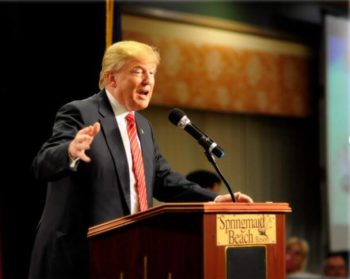
Donald Trump (Credit: DonaldJTrump.com)
The New York Times is being sued for libel over an editorial on monetary influence at President Donald Trump’s inauguration. Specifically, Bob Murray, CEO of coal company Murray Energy, which donated $300,000 to the Trump inauguration, is suing.
The April 24 editorial by The Editorial Board, “Money Talked Loudest at Donald Trump’s Inaugural,” claimed that Murray Energy “is a serial violator of federal health and safety rules” and “demanded that Mr. Trump gut regulatory oversight and pull the United States out of the Paris climate agreement in his first three months.”
The article also states Murray “falsely insisted that the 2007 collapse of his Crandall Canyon mine, which killed six miners, was due to an earthquake, not dodgy mining practices.”
Murray Energy sent iMediaEthics a copy of the lawsuit, which was filed in West Virginia. The Trump inauguration lawsuit states the New York Times made no effort to fact check. “Without making a single call to anyone in the Murray Energy organization to fact check its false assertions, [the New York Times] widely published defamatory statements that injured the reputation and business of Murray Energy, including the five companies within that organization that operate coal mines in this state,” the lawsuit claims.
The lawsuit states the Times falsely claimed or suggested
- “Murray lied about the cause of a collapse at a mine that tragically killed six people”
- “Murray’s organization acts outside the norms of industry regulatory compliance.”
Murray Energy issued a press release May 5 announcing the lawsuit. Oddly, the press release also states:
“The New York Times, of course, supported Hillary Clinton, who famously declared her agenda to ‘put a lot of coal miners and coal companies out of business.’ Murray Energy instituted this suit, in part, to attempt to ensure that such an agenda is not furthered by The New York Times‘ false and defamatory statements.”
Times spokesperson Danielle Rhoades Ha told iMediaEthics, “We have not seen the suit yet. However, we’re confident that our editorial was accurate and we intend to defend the case vigorously.”
New York Times public editor Liz Spayd wrote about the libel claim, noting that “I’m told by the legal department here that the last time the newspaper lost a libel suit in the United States was at least the early 1960s. (It has lost two in Russia, one in 2015.)”
Spayd also suggested Murray filed the lawsuit for publicity and questioned why the Times doesn’t get sued more often.
“It’s hard to tell whether Robert Murray has the stamina, or even the desire, to engage a sustained battle with The Times. My bet is that by grabbing a few headlines, he’s gotten most of what he came for,” she wrote. iMediaEthics asked Murray Energy about this suggestion, but the company declined to comment.
“But it’s curious how few companies or individuals actually do sue the paper for allegedly libelous claims,” she continued. “That’s a good thing if this is a measure of how rarely people feel defamed by The Times. It’s a bit more disconcerting if it suggests that those with a legitimate claim feel too intimidated to even try.”
In a Q &A with The Atlantic, Spayd denied the suggestion that she was saying the Times should be sued more. Her response was “What I’m saying is that I hope that for those who do have a legitimate claim, that they’re not intimidated to pursue a case against The New York Times. It’s a very formidable institution. I’m not encouraging phony or unsubstantial claims. I don’t think if you seriously read that, as opposed to some critique on Twitter, that you’d think that.”





